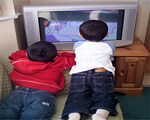Aggressive behaviour in young children has been linked to excessive television viewing. Just having the TV on when the child isnt watching is also linked to aggressive behaviour.

Researchers looked at 3,128 women (from 20 American cities) who had a child between 1998 and 2000. While there was some diversity of education among the study participants, one-third hadn't graduated from high school. Two-thirds of the mothers said their three-year-old watched more than two hours of TV a day, and the average viewing time for children was around three hours. On average, the TV was on for about five additional hours on a typical day.
After accounting for factors known to be associated with aggressive behaviour, such as living in a violent neighbourhood or having a mother who suffers from depression, TV watching and household TV time were both found to be still significantly associated with aggressive behaviour, such as hitting others, having angry moods, being disobedient, and screaming.
The American Academy of Pediatrics recommends no TV at all for children two and younger, and two hours a day or less for older kids. There are a number of ways that excessive TV viewing could contribute to a child's degree of aggressive behaviour. Children may see violence on TV, and time spent watching TV may mean less time for reading or playing.
The researchers concluded that parents have to consider the overall TV environment of the home, as well as how much TV their child is watching. Parents should be smart about TV use, and limit the time that children watch TV, paying attention to the content of TV programmes, and consider how TV is used throughout the home. Also, future research is needed to look both at TV content and at what's going on in a child's home when the TV is on.
DoctorNDTV is the one stop site for all your health needs providing the most credible health information, health news and tips with expert advice on healthy living, diet plans, informative videos etc. You can get the most relevant and accurate info you need about health problems like diabetes, cancer, pregnancy, HIV and AIDS, weight loss and many other lifestyle diseases. We have a panel of over 350 experts who help us develop content by giving their valuable inputs and bringing to us the latest in the world of healthcare.












